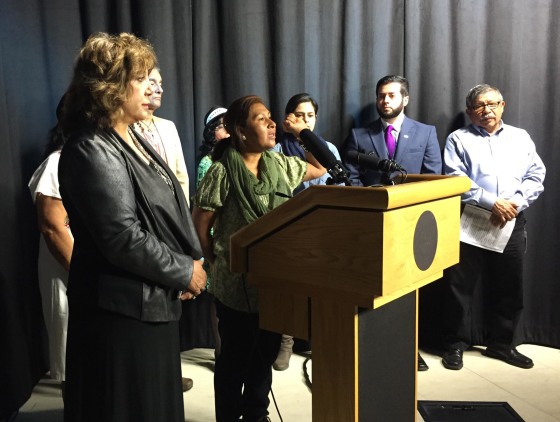AUSTIN, TX -- Speaking in anguished tones and choking back tears in Austin on Thursday, the grieving mother of one of 43 Mexican students missing since last September accused her country’s government of corruption in the case that has rocked Mexico.
“It was the government who took them. Now they want to blame organized crime, knowing that police and the military participated in this deed,” Maria de Jesus Tlatempa Bello, told reporters at Austin City Hall.
“We are not going to rest until they return our children. We feel they are alive. They took them alive,” Tlatempa said.
Tlatempa is among a number of relatives of the missing students who are touring dozens of cities across the U.S. to bring attention to the case and to condemn human rights violations in Mexico. Her son Eduardo is among the missing.
Tlatempa was joined by Omar Vazquez Arellano, who survived a deadly attack on the students last September in the Mexican state of Guerrero. They were scheduled to participate in a protest at the Mexican Consulate General’s office in Austin later in the day as well as in a community discussion at Santa Julia Catholic Church in the evening.
Earlier Thursday, they and representatives met with state legislators at the Capitol. A resolution expressing support for the missing students was expected to be read on the Texas Senate floor.
Known as the Ayotzinapa 43, after the name of the teacher training college they were attending, the students went missing Sept. 26, 2014, allegedly at the hands of police who turned them over to be killed by a drug gang. An attack on the students left three other classmates dead and many others wounded.
The students had been traveling by bus to the nearby town of Iguala to raise money for a trip to Mexico City, where they planned to demonstrate on the anniversary of a police-led massacre of students in 1968.
The Ayotzinapa 43 case has shaken Mexico to its core, triggering national outrage and widespread claims of government corruption and cooperation with organized crime and drug cartels.
Last November, federal authorities arrested Iguala’s mayor and his wife for allegedly ordering the attack. They said the couple ran the city in tandem with a local drug cartel.
Though DNA searches have only identified one of the missing students, the Mexican government said there was enough evidence and testimonies from those arrested to declare them dead.
But family members, including Tlatempa, dispute this. In Austin on Thursday, she said anonymous sources have reported seeing the students, but the government doesn’t act on the tips.
“How is it possible that we as poor families have to lead our own investigations, knowing that the government has weapons and intelligence to mount a large investigation,” Tlatempa said.
The Ayotzinapa caravan arrived in Austin on Wednesday evening. A coalition of more than a dozen Austin organizations raised money to help defray their expenses.
“This visit is important because Mexico is part of my heritage, and the love of my father and the Mexican government was instilled in me when I was very young. I hate to see a democracy so close to us be in such peril,” said Alicia Perez-Hodge with the League of United Latin American Citizens, one of the member organizations of the Austin with Ayotzinapa coalition.
Tlatempa said she was warmed by the support she has received in Austin.
“I see you have more heart than the people we’ve been dealing with in the Mexican government,” she said. “That’s why we’re here to ask for your help in finding our children.”
Vasquez, the student who survived the attack last September, said families and survivors were not in the U.S. to speak ill of their country and its people.
“We come to denounce the government which has not investigated this appropriately,” he said.
He and Tlatempa said the kidnappings of the Ayotzinapa students represented much larger problems in Mexico.
“In Mexico, unfortunately human rights are violated every day,” Vasquez said.
Relatives on the U.S. tour said they plan to take their case to Amnesty International, the United Nations and the Inter-American Commission on Human Rights.
Foreign Policy magazine reported this week that a U.N. report found torture is common in Mexican police stations and prisons and that authorities act with impunity. Another U.N. report last month criticized the country’s handling of what it called “enforced disappearances,” referencing the missing Ayotzinapa students, according to the magazine report.
